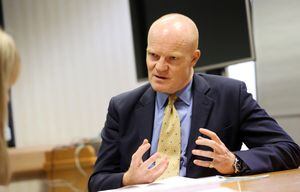States’ 2017 revenues come in £27m. better than budget
REVENUE income grew to almost £430m. at the end of 2017, with ‘renewed strength in the economy’ resulting in a £27m. increase on the budgeted position.

Policy & Resources president Gavin St Pier told the States the island’s current financial position, although still provisional and subject to final adjustment, ‘is positive and very welcome’.
‘But it cannot be assumed as ongoing, particularly when still faced with the uncertainties of Brexit and recognising that the global economy may be moving towards the end of a long growth cycle,’ he said.
‘We have to ensure that we continue to act prudently and to plan for the next five, 10 and 20 years and the challenges we know lie ahead.
‘In recent years, we have not had the harshest austerity that has been experienced by other governments elsewhere, but we are now reaping the benefits of fiscal discipline and control.
‘At the same time we have invested in our economy through the commitments made from the Future Guernsey Economic Fund including to the Digital Greenhouse, Locate Guernsey and Guernsey Finance.
‘We have underwritten our confidence with a commitment of £25m. to the Guernsey Investment Fund to support the development of innovation and technology.’
The 2017 Budget was based around breaking even, but delivered a £23m. surplus.
Committees and authorities collectively underspent against their budgets by just over £5m. in 2017. P&R has reinstated the full £42.9m. transfer to the Capital Reserve.
Health & Social Care underspent its budget by approximately £2.5m., despite earlier returning £2m. to general revenue as a recurring saving.
‘This is excellent news and continues the trend of restraint seen in the second half of 2016,’ said Deputy St Pier.
‘Although, as the Health & Social Care has previously warned, this trend is unsustainable in light of inexorable increases in demand without the transformation of services through the Partnership of Purpose on which the States has now embarked.’
However, Education, Sport & Culture has, as predicted, overspent its authorised budget by almost £2.2m.
The committee’s new president, Deputy Matt Fallaize, will be making a statement to the Assembly in March on the financial position it has inherited.
Economic Development has overspent by £400,000, due to a £1m. provision being made for fees incurred by the Public Trustee which ‘may prove to be unrecoverable’.
The committee has since pledged to strengthen the governance and legislation of the Office of the Public Trustee.
Alderney has reduced its forecast overspend from £450,000 earlier in 2017 to under £100,000 by the end of the year.
To invest in new or improved services and relieve budgetary pressures, Deputy St Pier said committees must ‘challenge the status quo and ensure that opportunities to change the way public services are delivered – particularly where they have been identified such as in PWC’s work last year – are fully explored and implemented.’
The financial figures were boosted by ‘exceptionally strong income tax receipts’, with 1,607 more people working in March 2017 than in March 2015, and company income taxes rising by 22% on last year.
General revenue has also benefited from investment returns of £4.4m. – £3.5m. in excess of the budget.
In terms of capital expenditure only £9m. was spent from the capital reserve in 2017. In reply to a follow-up question from Deputy Chris Green, Deputy St Pier said the 3% States spending target ’clearly needs to be reviewed’ for a number of reasons, not only last year’s expenditure and the recalculation of GDP.





